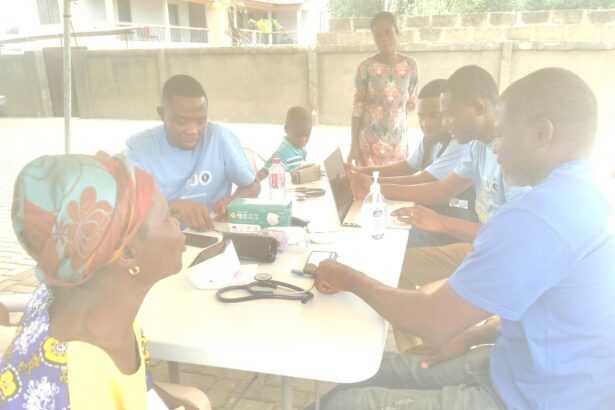Epidemiologists, supported by the Department of Epidemiology and Biostatistics at Fred Newton Binka School of Public Health, University of Health and Allied Sciences (UHAS), conducted a two-day free health screening for displaced individuals in Mepe, North Tongu District, Volta Region.

This initiative aimed to assist victims affected by the Akosombo Dam spillage, which caused widespread flooding, and to raise awareness about the role of field epidemiologists in healthcare.
Approximately 500 residents from Mepe and surrounding areas were screened for conditions such as diabetes, hypertension, malaria, typhoid fever, obesity, and body mass index. Additionally, screenings included rabies vaccinations for dogs and cats, and other animal-related diseases.
Dr. Grace Adjoa Ocansey, President of the Field Epidemiologists and Laboratory Alumni Network of Ghana (FELANG), stated that the exercise was part of World Epidemiology Day activities, showcasing their expertise in managing disease outbreaks as frontline responders.
She highlighted that field epidemiologists are specially trained public health specialists focused on responding to emerging disease outbreaks.
Dr. Adjoa Ocansey emphasized that field epidemiologists are promptly deployed to address health threats in the country.

She highlighted their crucial role during the COVID-19 pandemic, where they supported the Ghana Health Service’s surveillance department in investigating and tracing contacts, significantly contributing to the control of the virus.
Dr. Ocansey pledged her organization’s ongoing support in combating disease outbreaks and urged the government to use the COVID-19 levy as a public emergency fund, rather than relying solely on the generosity of public-spirited organizations.
Dr. William Kofi Tasiame, Senior Lecturer at the School of Veterinary Medicine, Kwame Nkrumah University of Science and Technology (KNUST), called for greater collaboration between medical and veterinary professionals.

He stressed the importance of routine health screenings for both humans and animals to ensure the health and safety of food sources.
Dr. Tasiame pointed out that diseases like rabies can transfer from animals to humans, underscoring the need for regular veterinary checks.
Sampson Kwame Hlorlewu, an opinion leader in Mepe, expressed gratitude for the timely health screening, which he noted was especially needed due to the recent flooding that displaced thousands and caused significant property loss.
He urged other health institutions to follow suit to help the community recover and maintain their health.
























































![[FREE FREE MONEY] Predict and Win a Guaranteed GH¢200 From Us EVERY WEEK](https://wordpress.ghanatalksradio.com/wp-content/uploads/2022/02/Predict-and-Win-Final-09-03-2021-218x150.jpg)
![[Predict & Win – 8th/Oct.] WIN A Guaranteed ¢200 From Us This Week](https://wordpress.ghanatalksradio.com/wp-content/uploads/2021/10/maxresdefault-16-218x150.jpg)
![[Predict & Win – 2nd] WIN A Guaranteed ¢200 From Us This Week](https://wordpress.ghanatalksradio.com/wp-content/uploads/2021/09/maxresdefault-50-218x150.jpg)
![[Predict & Win – 25th] WIN A Guaranteed ¢200 From Us This Week](https://wordpress.ghanatalksradio.com/wp-content/uploads/2021/09/maxresdefault-36-218x150.jpg)
![[Predict & Win – 18th] WIN A Guaranteed ¢200 From Us This Week](https://wordpress.ghanatalksradio.com/wp-content/uploads/2021/09/maxresdefault-23-218x150.jpg)










![[National cathedral] See full list of churches that have contributed since 2018](https://wordpress.ghanatalksradio.com/wp-content/uploads/2020/09/Ghana-National-Cathedral-GhanaTalksRadio-100x70.jpg)



